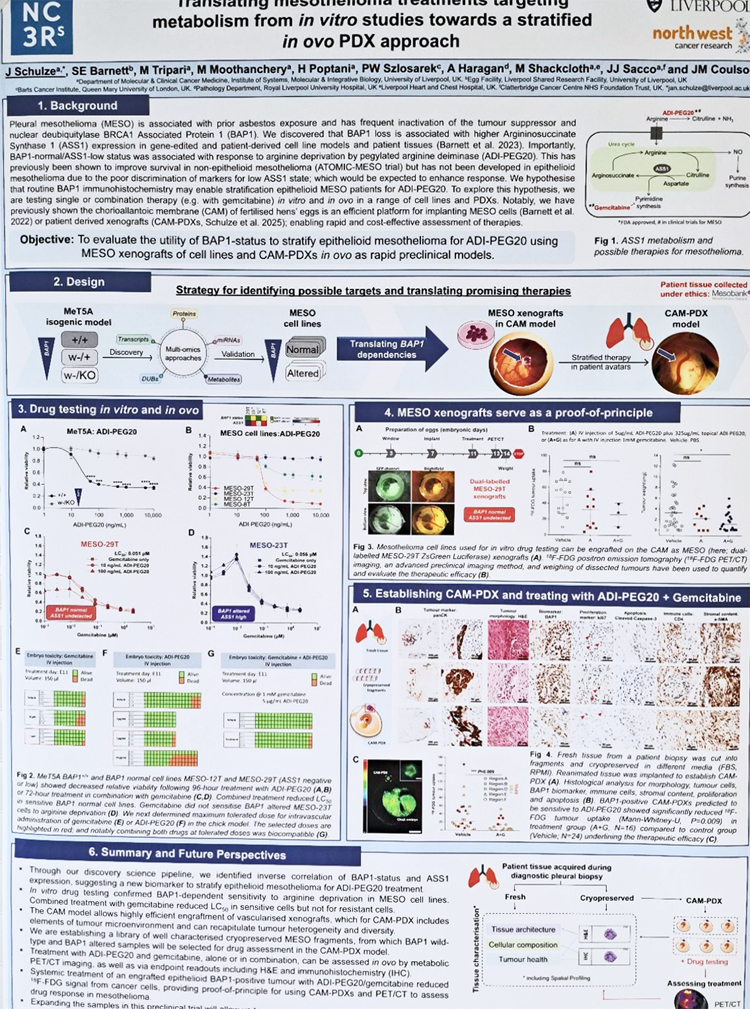MAVSG Report On Mesothelioma
Research Conference Held In Leeds
Thursday 15 May 2025

 Derek Maylor, Merseyside Asbestos Victims Support Group trustee and CWU Retired member, having psent many years in the role of Chair of the North West BTU Health & Safety Co-ord; continues his health & safety passion with his work reporting on Mesothelioma and all things to do with Asbestos.
Derek Maylor, Merseyside Asbestos Victims Support Group trustee and CWU Retired member, having psent many years in the role of Chair of the North West BTU Health & Safety Co-ord; continues his health & safety passion with his work reporting on Mesothelioma and all things to do with Asbestos.
Here he reports on this week's research conference:
This event organised by the Trustees of the June Hancock Mesothelioma Research Fund, was a presentation of the latest news from researchers, their findings and the progress of their work; opened by Kimberley Stubbs (June’s daughter) and Russell Hancock (June’s son).
The Trust runs with no staff or premises, so everything earned goes on organising or researching.
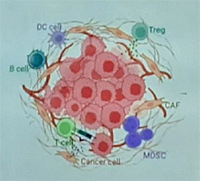 Professor Stefan Marciniak, Cambridge was unable to attend in person but discussed why mesothelioma research was challenging, including fundraising. The marketplace, big pharmer, do not want to invest in the “lesser” cancers as even with a result that there is not as much money to be made for subsequent treatment, so they are less likely to invest.
Professor Stefan Marciniak, Cambridge was unable to attend in person but discussed why mesothelioma research was challenging, including fundraising. The marketplace, big pharmer, do not want to invest in the “lesser” cancers as even with a result that there is not as much money to be made for subsequent treatment, so they are less likely to invest.
Mesothelioma fights back, the tumour environment fights back, suppressing the immune system and puts up barriers to treatment; it changes and hides so it is hard to pin down for treatment even within the same patient. The UK has the highest rate of mesothelioma in the world with Australia second, which shows the legacy of asbestos usage in the UK. The BRIC countries (Brazil, Russia, India, China) are still using asbestos like the UK did in the fifties & sixties.
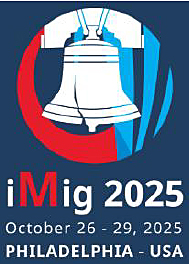 Dr Kate Hill, Trustee, noted that research has led to more knowledge of Mesothelioma treatment in last five years than the preceding twenty-five, there is a growing international collaboration and respect for sharing. Every trial is a learning event, even if that learning is not to try it again, which when shared frees others go in a different direction and not waste time and effort.
Dr Kate Hill, Trustee, noted that research has led to more knowledge of Mesothelioma treatment in last five years than the preceding twenty-five, there is a growing international collaboration and respect for sharing. Every trial is a learning event, even if that learning is not to try it again, which when shared frees others go in a different direction and not waste time and effort.
There is the iMeg Conference in Philadelphia in October (ref. 1), it will be the 17th International Conference of the International Mesothelioma Interest Group. I did question whether there was on opportunity to attend this online, but it appears not.
 Dr Carsten Hansen from the Federation of American Societies for Experimental Biology: Florida, USA; Nov 2024. The Hippo Pathway in Biology and Disease was created by small seed funding which enable the evidence to attract a larger bid to enable in-depth research. This offered a much more personalised treatment, similar to the Liverpool egg treatment though not as specialised however, such therapeutic targeting does seem to be “the way to go” as a lay person on the subject.
Dr Carsten Hansen from the Federation of American Societies for Experimental Biology: Florida, USA; Nov 2024. The Hippo Pathway in Biology and Disease was created by small seed funding which enable the evidence to attract a larger bid to enable in-depth research. This offered a much more personalised treatment, similar to the Liverpool egg treatment though not as specialised however, such therapeutic targeting does seem to be “the way to go” as a lay person on the subject.
The name, Hippo Pathway, came from a comment when looking at a tumour under treatment and it stuck, the mechanistic link between Hippo pathway dysfunction and inflammation in mesothelioma is being studied in biopsy samples to identify treatment strategies to improve patient outcomes.
Dr Astero Klampatsa and Dr Florencia Secchiari from the Institute of Cancer Research, London, talked about how a slice of a tumour can live up to ten days to allow a variation of treatments to be trialled, tweaked, tested to compare different results. This proteomic technology is looking for new biomarkers and treatment targets and is the first in-depth proteomic analysis on mesothelioma tumour samples, already successful in the treatment of other rare cancers.
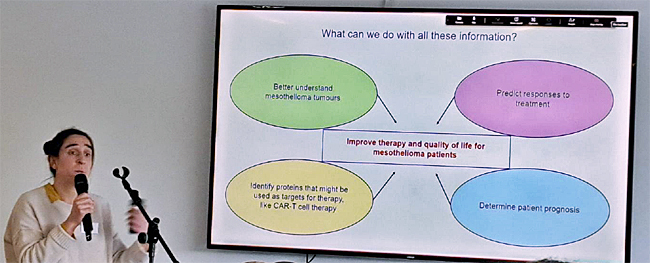
Tageting ERK5 to treat Mesothelioma was the subject of Dr Katie Finegan, notably pointed out that which treatments like chemotherapy looked to kill a cancerous tumour, the treatment here being looked at was to remove the environment around the tumour that allowed said tumour to exist, to survive and grow. This may, hopefully, be less invasive and traumatic treatment for the patient. When taking notes and pictures I noted on the slides that it was requested that the information was all in confidence and as such not to copy and share so limited if commenting on an interesting presentation.
The afternoon stated with friends and colleagues of Mavis Robinson remembering her work and commitment to support others see references (2) and (3.
Dr Matthew Wong (PI: Dr Olivier Pardo) Validation of a novel therapeutic strategy and associated response biomarkers for replacing current standard-of-care in mesothelioma treatment. Response biomarkers replacing current in mesothelioma treatment, particularly fibrosis which prevents drugs from reaching the tumour effectively the interaction between mesothelioma cells and fibroblasts which are the cells responsible for fibrosis. By using existing drugs differently, he will be able to speed up the time scales involved.

There was a Fellowship Award for Dr Barbara Tanos and Rebecca Collinson from Brunel University, revisited fibroblasts research, this time referencing primary cilia which are present on mesothelioma cells and the cancer-associated fibroblasts adding to previous work on drug resistance in lung cancer.
This could change the support for patients by allowing intervention to bypass resistance that have been blocking treatment.
In concluding the event there was a Dragon’s Den sort of sales pitch for the Poster Presentation which included:
Zain Mahmood on the use of animal-free hydrogels in the development of an advanced model of malignant mesothelioma.
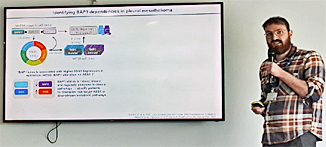 A friend of MAVSG, Dr Jan Schultze, described Liverpool University’s translating mesothelioma treatments targeting metabolism from in vitro studies towards a stratified in ovo PDX approach. The full poster see (4).
A friend of MAVSG, Dr Jan Schultze, described Liverpool University’s translating mesothelioma treatments targeting metabolism from in vitro studies towards a stratified in ovo PDX approach. The full poster see (4).
Dr José Antonio Valer Multi-omic analyses to elucidate mesothelioma heterogeneity and guide therapy development.
Professor Angela Tod – the rapid deterioration and sudden death in mesothelioma: impact on bereaved family carers in the UK; understanding barriers and facilitators to receiving systemic anti-cancer treatment (SACT) for mesothelioma patients and preparing families of mesothelioma patients for a coronial investigation: recommendations for clinical practice.
An excellent and informative event ended positively with Professor Judy Coulson and the aforementioned Dr Jan Schulze inviting MAVSG to visit Liverpool University again to be updated/refreshed on their interesting and pioneering work.
References:
1.
iMeg 2025. (2025). Fostering Global Collaboration. [Online]. International Mesothelioma Interest Group. Last Updated: xxx. Available at: https://imig2025.org/ [Accessed 17 May 2025].
2.
John Flanagan. (2025). Remembering the late Mavis Robinson MBE. [Online]. MAVSG. Last Updated: April. Available at: https://mavsg.org/news/remembering-the-late-mavis-robinson-mbe/. [Accessed 17 May 2025]
3.
Web-editor. (2025). Obituary and Tribute: Mavis Robinson MBE. [Online]. JHMRF. Last Updated: 4 April. Available at: www.junehancockfund.org/2025/news/obituary-and-tribute-mavis-robinson-mbe. [Accessed 17 May 2025].
4. Poster
